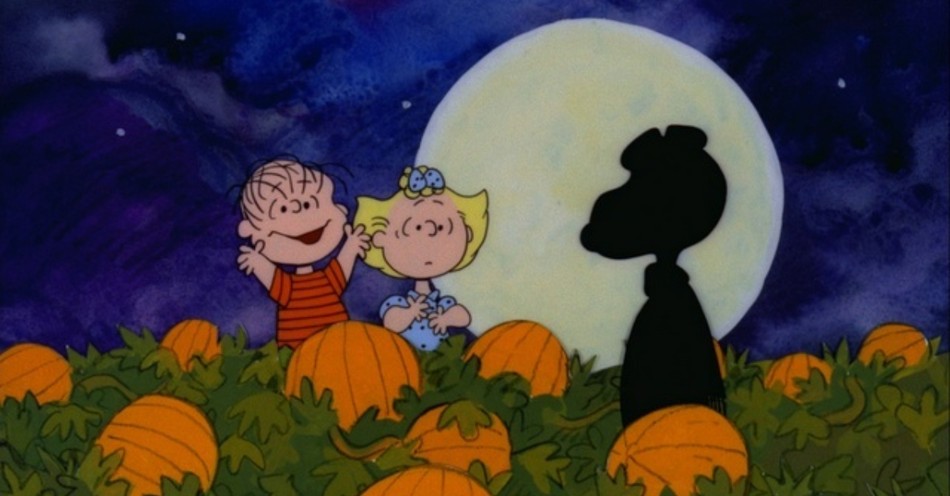Proverbs 1:20 tells us, “Wisdom cries aloud in the street, in the markets she raises her voice;” This is true even as we view seasonal media specials, such as It’s the Great Pumpkin, Charlie Brown. This fall favorite reveals at least one hidden spiritual lesson.
What Is the Plot of It’s the Great Pumpkin Charlie Brown?
It’s Halloween, and the Peanuts gang is all in for the festivities—tricks-or-treats, a Halloween party. The story’s main character, Linus, anxiously waits with Sally to see… the Great Pumpkin.
Meanwhile, Snoopy portrays a World War 1 flying ace and lands near the pumpkin patch where Linus and Sally watch for the Great Pumpkin. Linus mistakes Snoopy’s silhouette for the Great Pumpkin and passes out, while a disgruntled Sally—who recognizes Snoopy—screams, “I was robbed!” She angrily goes on about missing tricks-or-treats and a bag filled with candy, apples, gum, cookies, and money.
The other subplot involves Charlie Brown, the consummate loser. Once again, he falls for Lucy’s promise to hold the football so he can kick it, and while all his friends get candy and other goodies thrown into their trick-or-treat bags, Charlie gets rocks.
At the Halloween party, the first party invitation he’s ever received, Charlie Brown is delighted he’s asked to be a model. To his dismay (and embarrassment), Violet turns him around and draws a pumpkin face on his bald head so Lucy can carve the image on the pumpkin.
No Great Pumpkin. No candy in Charlie Brown’s sack.
The show ends with Charlie Brown and Linus on the “conversation wall” the day after Halloween. Charlie Brown tells Linus about his sack full of rocks and says, “So, the Great Pumpkin showed up?” A dejected Linus says, “Nope.” Charlie Brown tells Linus he’s done a lot of stupid things, too, which sets Linus off, and he begins a tirade and yells at Charlie Brown as the credits roll. He defends his actions and tells his friend to wait because he’ll be in that pumpkin patch when the Great Pumpkin appears next year.
What Is the Great Pumpkin that Linus Believes In?
We see Linus writing a letter to the Great Pumpkin, whom he believes will come on Halloween night. He hopes the Great Pumpkin will bring him many toys (much like Santa Claus). Charlie Brown asks Linus who he’s writing to, and Linus explains the Great Pumpkin rises out of his pumpkin patch and flies through the air with his bag of toys for all the children. He tells Charlie Brown the Great Pumpkin has to work harder because he’s number two (after Santa).
Charlie Brown calls Linus crazy and asks him why he insists on believing something untrue. Linus holds to his belief even when Lucy and Patty belittle him. Linus believes the Great Pumpkin only brings toys to good kids, and the pumpkin patch must be sincere. Linus believes his pumpkin patch is the “most sincere” and says the Great Pumpkin just has to pick his patch because no other patch is more sincere, and he says not a bit of hypocrisy exists in his patch.
We see faith, hope, belief, and loyalty in Linus. While we know his faith is grounded in a myth, Linus’ genuine and patient belief, amid ridicule from family and friends, and his unmet expectations of the unseen, are noble.
What Can We Learn from It’s the Great Pumpkin, Charlie Brown?
We can glean spiritual lessons not just from Linus’ story but also from other characters.
Our surprising spiritual lessons from Linus include the following:
Faith (or Belief). Linus has unwavering faith in the Great Pumpkin’s imminent appearance. Even as he endures his scoffing sister, unbelieving friends, and a non-appearing idol, Linus keeps believing. He wants his faith to be rewarded and to tell his friends his faith was not for nothing.
For us, our faith in Jesus Christ is to be the same—unwavering, yet ours is sure and true (John 20:31; 1 Thessalonians 1:4). Our faith is rewarded every day with God’s ongoing wondrous works in our lives and in the lives of the faithful who came before us (Hebrews 2:4; 12:1).
Hope. Linus hopes upon hope he will one day see the Great Pumpkin and receive gifts from him. His hope resides in what he will receive, and it’s a selfish hope, for his apparent desire is toys.
Our hope as Christians is in our eternal Lord and Savior, Jesus Christ. Upon repentance and faith, we receive that which will never fade (Colossians 1:5; James 1:11; 1 Peter 1:3-4)—eternal life in the presence of our Lord Jesus Christ.
Loyalty. No matter the ridicule, Linus holds true to his belief in the person of the Great Pumpkin. Christians have every reason to hold fast to Christ (Luke 8:15). We endure tribulation in the world (Matthew 13: 18-23; John 16:33), but Jesus assures us, “But take heart, I have overcome the world” (John 16:33b).
Patience. Every year, Linus waits for the Great Pumpkin’s arrival. And he is not just a pumpkin; he is great. At the story’s close, Linus proclaims his intent to wait for the arrival of the Great Pumpkin next year. Christians wait for our Lord to either return or call us home. As we live in this world, we are patient, knowing Jesus will fulfill His promises (2 Timothy 4:8). Everything about our Lord Jesus is great (Matthew 24:30; Luke 1:32, 49; 2:10; Ephesians 2:4; Revelation 11:17). Another truth to remember about Jesus is He is preeminent in everything (Colossians 1:15-20).
Sincerity. Unlike Sally, Linus does not believe in the Great Pumpkin just for the benefits. He sincerely keeps his beliefs, although we are not shown how that belief began. Christians are told to be sincere in our beliefs and even commanded always to be ready to share why we believe as we do (1 Peter 3:15).
We also see the following traits from other characters in the story:
Scoffing. Lucy, Sally, and Charlie Brown all take turns scoffing at Linus’ belief in the Great Pumpkin, yet Linus stalwartly keeps his faith. Jesus endured the scoffing crowds at the cross (Matthew 17:42; Mark 15:31; John 19:1-37), and we endure ridiculers who question our faith and wonder why He—the object of our faith—has not yet returned as He said He would (Proverbs 1:22; 2 Peter 3:4).
Selfishness. Lucy exemplifies utter selfishness, albeit with faint glimmers of compassion (although when she took her freezing brother out of the pumpkin patch and placed him in his bed, she wore a scowl). Lucy is all about Lucy. At the show’s outset, Lucy and Linus head out to select what Lucy decides is the best one to carve for Halloween. Linus is her willing assistant and hoists and rolls the ponderous pumpkin home.
Christians are encouraged to “Do nothing from selfish ambition or conceit, but in humility count others more significant than yourselves” (Philippians 2:3). Quite a contrast with Lucy.
In a minor way, we can learn about long-suffering from Charlie Brown, although his trust is open to doubt. Every year, he wrongfully trusts Lucy will hold the football while he runs up to kick it. And he tolerates the same outcome every year—a head-over-heels swooping crash to the ground as Lucy sneers.
What Are Some Other Charlie Brown Stories with Spiritual Lessons?
The one Peanuts special that immediately comes to mind regarding spiritual lessons is A Charlie Brown Christmas. Part of the annually aired Christmas show presents the narrative of Jesus’ birth. Charles M. Schulz wanted Linus’ recitation from Luke 2:8-14 left in the production, but the producers hesitated to include it. Its inclusion became one of the special’s most celebrated moments. A Charlie Brown Christmas has served to delight, inspire, and even rejuvenate the faith of many.
Writer and pastor Jason Soroski says of Linus’ blanket-dropping moment:
“Just like Linus, we may stand tall in a moment of faith and conviction, a moment when Scripture hidden in our heart comes to life, and all else is flung aside as we experience and proclaim the true freedom and security that only Jesus can give. But at some point, out of habit, we reach down and pick that thing right back up. Faith, while powerful, is also delicate.”
Other Peanuts stories with spiritual lessons:
The 1972 special Snoopy Come Home has the same basic plot elements (acceptance or adoption) as many other Peanuts specials. In this one, Snoopy finds his original owner and feels compelled to stay with her until he finds no dogs are allowed in her apartment building. He joyfully returns to Charlie Brown, who took him in as he was and adopted him as his best friend. Christians face hurdles as they identify as belonging to and obeying Christ; He is our hiding place (Psalm 32:7; 119:114).
The 1990 special Why, Charlie Brown, Why? (later the basis for the 2002 book) centers on Linus and a young girl diagnosed with leukemia. Snoopy plays a world-famous surgeon, and the story contains a strong sense of compassion and love.
The Peanuts Movie, released in 2015, revolves around the love lives of Charlie Brown and Snoopy and what each will do to win their beloveds. Charlie Brown and Snoopy try to exemplify themselves as winners to woo girls and not be who they truly are. Writer Damien Love reflects on Charles Schulz, “He named his characters after co-workers he encountered: there was a real Charlie Brown; there was a Linus; and there was a girl with red hair called Donna Johnson whom Schulz wanted to marry, but who turned him down and married a fireman. He never forgot the rejection.” This comes out in the story of Charlie Brown and the little red-haired girl from across the street.
The Bible tells us we are new creations in Christ (2 Corinthians 5:17), and as His, our identity is in Him and for Him. We are His ambassadors (2 Corinthians 5:20) and only reflect Him and not our flesh. God has not rejected us. Instead, He has adopted us as His children (Romans 8:16-17).
Was Charles Schultz a Christian?
Charles M. Schulz became a Christian in the 1940s, shortly after returning to the United States after his WWII service. He described his cartoons as a way to share his faith. In Robert Short’s book The Gospel According to Peanuts, Schultz is quoted saying:
“…naturally I must exercise care in the way I go about expressing things. I have a message that I want to present, but I would rather bend a little to put over a point than to have the whole strip dropped because it is too obvious. As a result . . . all kinds of people in religious work have written to thank me for preaching in my own way through the strips. That is one of the things that keep me going.”
Charles M. Schulz died of colon cancer on the same day his long-running comic strip Peanuts saw its final publication. Mr. Schulz’s beliefs developed as he aged, and scholars debate his final views. One biographer (David Michaelis) claims Schulz lost his faith. Another (Stephen J. Lind) argues the comic strip creator’s faith became complicated and may have strayed from orthodoxy but never disappeared.
While scholars debate Charles Schulz’s beliefs, we can still say that secular media hones a Christian’s perspective. True Christians have a distinct worldview—solidified by faith in a risen Savior, cemented by the Holy Spirit’s witness to our spirits that we are children of God (Romans 8:16). As Christians, we not only have spiritual discernment (Romans 12:2; 1 Corinthians 2:14) and wisdom (James 3:13-18), but we are also to use this judgment in all situations (Hebrews 5:14), even as we view secular media. It hones our apologetics (defense of our faith) to be on the lookout for any lessons the Lord would have us learn and which would help us lead Gospel conversations. It’s the Great Pumpkin, Charlie Brown is no exception.
Photo Credit: © Lee Mendelson Productions via IMDb










